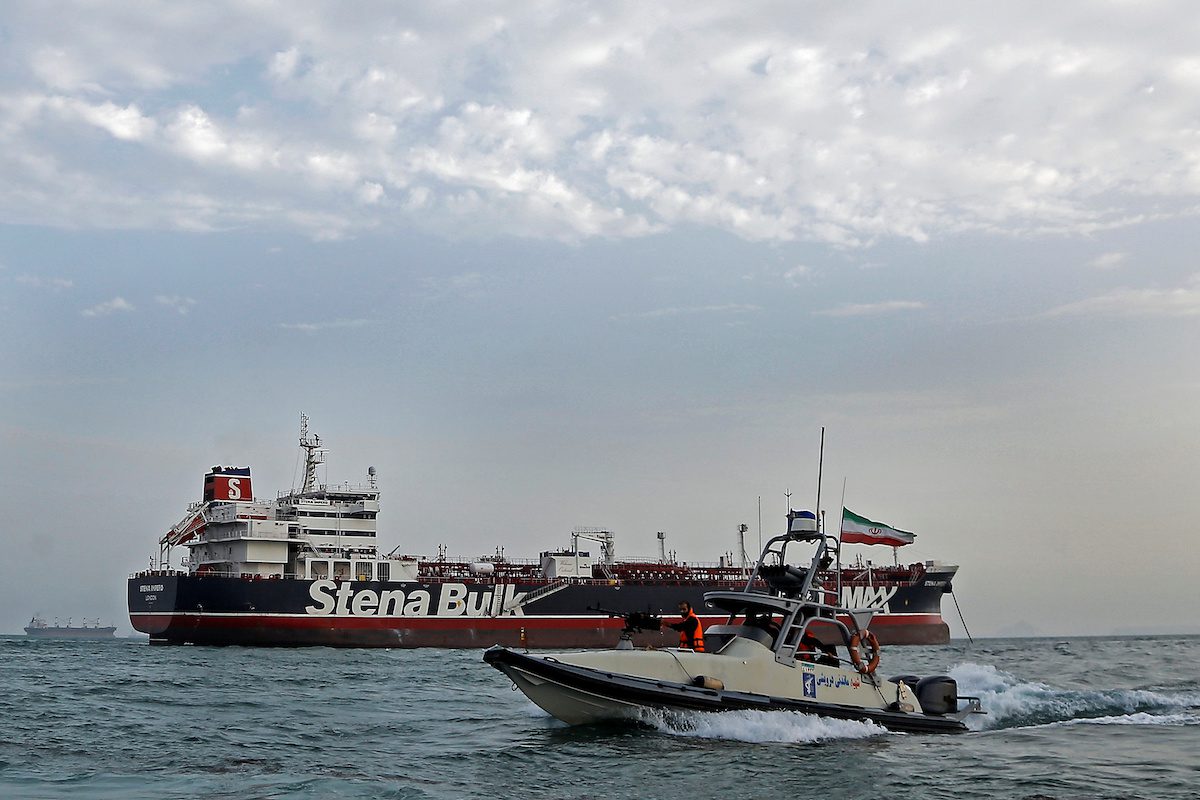A boat of Iranian Revolutionary Guard sails next to Stena Impero, a British-flagged vessel owned by Stena Bulk, at Bandar Abbas port, July 21, 2019. Iran, Mizan News Agency/WANA Handout via REUTERS
By Leonid Bershidsky (Bloomberg Opinion) –The seizure of a number of ships in recent months tells an uncomfortable story. In today’s multi-polar world, countries can grab other nations’ vessels and get away with it.
It’s not just Iran’s detention of the U.K.-flagged Stena Impero in retaliation for the seizure of one its own tankers by Britain. In recent months, other incidents have occurred that had nothing to do with smuggling or fishing disputes, the standard reasons for vessels to be stopped and held by governments. These detentions are geopolitical in nature.
In November, Russia grabbed three small Ukrainian naval vessels that tried to break through its de facto blockade of the Kerch Strait, a barrier intended to defend an expensive bridge Moscow has built to annexed Crimea. It continues to hold the Berdyansk, Nikopol and Yeni Kapu and their crews – despite an order from the International Tribunal for the Law of the Sea to release them. Moscow disputes the tribunal’s jurisdiction and maintains that the vessels crossed the border illegally.
On Thursday, Ukraine retaliated by seizing the Nika Spirit, a Russian oil products tanker. According to Ukrainian intelligence, the same vessel was used to block the three ships’ passage under the Crimea bridge.
Then there’s the seizure of the North Korean bulk carrier Wise Honest by the U.S. in May, the first ever over alleged violations of international sanctions on the dictatorship.
Kim Jong Un’s regime hasn’t retaliated because it wants to get the Wise Honest back rather than escalate the row. The cargo ship is North Korea’s second biggest, and losing it is a major blow to the country’s shaky economy.
Meanwhile, there has been talk in the U.S. about trading the Wise Honest for USS Pueblo, the spy ship North Korea captured in 1968. Its crew was returned to the U.S. after 11 months in captivity; some of it are now pushing for the swap. And last week, a U.S. federal court approved the Wise Honest’s sale to pay compensation to the family of American student Otto Warmbier, who died after being imprisoned in North Korea.
These ship seizures all have something in common: Military or diplomatic advantages that mean one side feels it can act with impunity.
Obviously, Iran could do nothing to prevent the U.K. from grabbing the Grace 1 near Gibraltar. But Britain, too, simply didn’t have the naval power in the Persian Gulf to stop Iran from trying to take one its ships. Its depleted navy has a single frigate in the region, which cannot be everywhere at the same time. The U.S. theoretically, has the resources to stop Iran from hunting British ships, but has chosen not to interfere.
Ukraine lacks the naval power to stop Russia from claiming the Kerch Strait as its own, just as it lacks the military clout to take back Crimea. While Western countries have loudly demanded that Russia free the Ukrainian ships and sailors, there’s nothing they can do to force Moscow to comply without creating an unnecessary escalation and perhaps harming Ukraine.
But then, Russia, for its part, can’t start an all-out war with Ukraine over a tanker built in 1989. The costs would clearly outweigh the benefits; besides, just to be on the safe side, Ukraine has let the crew go after treating it with the utmost politeness. Russia only threatened “consequences” if its sailors are held hostage.
In the U.S.–North Korea case, if the Wise Honest is sold for the benefit of Otto Warmbier’s family, Kim’s regime conceivably could strike back. If that were to happen, the U.S.’s options would be limited since North Korea is a nuclear power now.
International rules, such as multilateral sanctions or the Law of the Sea, are nothing without reliable enforcement. But these seizures reveal unsteady balances that make enforcement difficult at best. Rogue actors, such as Iran, North Korea and the Putin regime in Russia, or merely opportunistic ones, as in the cases of Ukraine and, yes, Trump’s U.S., can grab others’ property and people, too, in order to set up trades and bolster their weak diplomatic positions.
Exchanges of ships and hostages are too distasteful and too fraught with consequences to contemplate, as my Bloomberg Opinion colleague Bobby Ghosh recently wrote in reference to the Iran-U.K. situation. I would argue, however, that they may be necessary where captured crews are involved; Ukraine, for example would be entirely justified in finding Russian prisoners to trade for its sailors. President Volodymyr Zelenskiy’s reluctance to accept anything but their unconditional release can only prolong their suffering.
In the Iran-U.K. case, the sailors aren’t nationals of the two countries involved, and they shouldn’t be subject to any horse-trading. Both sides should just let them go home. In the U.S.-North Korea dispute, the Wise Honest’s crew wasn’t held.
When it comes to the hardware, at least two swaps – between the U.S. and North Korea and between Ukraine and Russia – would likely create win-win situations for all sides without creating potential for any further tit-for-tat seizures. But within a broader global context, they would send the wrong signal: That the global order is a free-for-all, in which the only solutions are transactional rather than dictated by universally accepted rules.
In any case, the shipping industry should take note: Without adequate protection, ships can easily turn into geopolitical chips when they sail into waters where their countries’ adversaries can use force with relative impunity.
© 2019 Bloomberg L.P

 Join The Club
Join The Club











